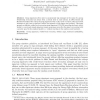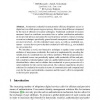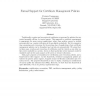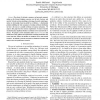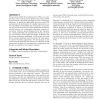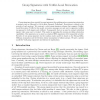140
click to vote
CANS
2009
Springer
14 years 12 months ago
2009
Springer
Group signatures allow users to anonymously sign messages in the name of a group. Membership revocation has always been a critical issue in such systems. In 2004, Boneh and Shacham...
130
click to vote
SCN
2010
Springer
14 years 12 months ago
2010
Springer
Anonymous credential system promise efficient, ubiquitous access to digital services while preserving user privacy. However, their diffusion is impaired by the lack of efficient re...
110
click to vote
WIOPT
2010
IEEE
15 years 12 days ago
2010
IEEE
—Revocation of public-key certificates is an important security primitive. In this paper, we design a fully distributed local certificate revocation scheme for ephemeral networ...
145
click to vote
JNW
2008
15 years 16 days ago
2008
The article proposes a simple, scalable and robust scheme for the distribution of revocation information in mobile ad hoc networks (MANETs). The scheme is intended for ad hoc netwo...
115
click to vote
COMPSEC
2004
15 years 1 months ago
2004
Traditionally, creation and revocation of certificates are governed by policies that are carried manually, off-line, by trusted agents. This approach to certificate management is ...
140
click to vote
INFOCOM
2000
IEEE
15 years 5 months ago
2000
IEEE
Abstract--The advent of electronic commerce and personal communications on the Internet heightens concerns over the lack of privacy and security. Network services providing a wide ...
147
click to vote
EUROPKI
2006
Springer
15 years 5 months ago
2006
Springer
Privacy-aware Public Key Infrastructure (PKI) can maintain user access control and yet protect user privacy, which is envisioned as a promising technique in many emerging applicat...
144
click to vote
CCS
2004
ACM
15 years 5 months ago
2004
ACM
Group signatures have recently become important for enabling privacy-preserving attestation in projects such as Microsoft's ngscb effort (formerly Palladium). Revocation is c...
161
click to vote
CRYPTO
2001
Springer
15 years 6 months ago
2001
Springer
We deal with the problem of a center sending a message to a group of users such that some subset of the users is considered revoked and should not be able to obtain the content of...
107
click to vote
SIGECOM
2005
ACM
15 years 7 months ago
2005
ACM
When distributing digital content over a broadcast channel it’s often necessary to revoke users whose access privileges have expired, thus preventing them from recovering the co...
